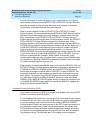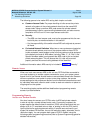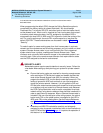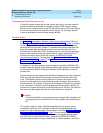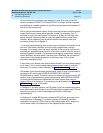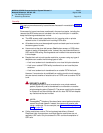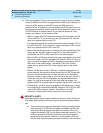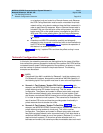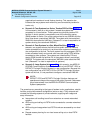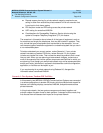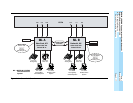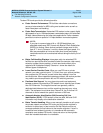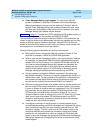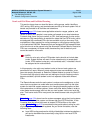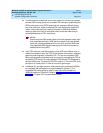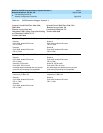
MERLIN LEGEND Communications System Release 6.1
Network Reference
555-661-150
Issue 1
August 1998
Call-Handling Scenarios
Page 2-15Network Configuration Scenarios
2
organizational needs and overall feature planning. This scenario also
illustrates the way systems work when they are connected by tandem tie
trunks only.
■ Scenario 3: Four Systems in a Series, Tandem PRI Facilities, page 57.
In this scenario, there is no hub system. Instead the systems are
connected in a linear fashion. Three systems are joined by tandem PRI
facilities. A fourth system is connected to one of the others by analog
(E&M) tandem tie trunks. One of the systems has its own VMS/AA and the
other three share a centralized VMS/AA. The system with the centralized
VMS/AA is also called the VMS hub. (Release 6.1 or later is required for all
systems sharing the centralized VMS/AA.)
■ Scenario 4: Four Systems in a Star, Mixed Facilities, page 74. In this
scenario, one system acts as the hub and has public-switched network
trunks connected to its control unit, as do two other systems connected in a
star configuration
to the hub. The fourth system has only emergency PSTN
trunks connected locally and normal calls are made using PSTN facilities
connected to other systems. The systems are linked both by PRI and
analog (E&M) tandem tie facilities. All of the systems share a centralized
VMS/AA. The system with the centralized VMS/AA is also called the VMS
hub. (Release 6.1 or later is required for all systems.)
■ Scenario 5: Large System Hub, page 88. In this scenario, two MERLIN
LEGEND Communications Systems are linked to a hub DEFINITY ECS or
DEFINITY ProLogix Solutions system in a star configuration. Because this
star configuration has a DEFINITY ECS or DEFINITY ProLogix Solutions
system as the hub, it is not possible to configure a centralized VMS/AA.
NOTE:
DEFINITY ECS and DEFINITY ProLogix Solutions features and
operations are beyond the scope of this guide. Scenario 5 discusses
the private network from the MERLIN LEGEND Communications
Systems perspective.
The scenarios vary according to the types of tandem trunks, applications, outside
facilities, and private network configuration (series or star). They compare and
contrast the following aspects of private networks, supplying both usage and
setup information:
■ Intersystem call-handling to and from extensions on remote networked
systems
■ ARS routing and calling via PSTN trunks connected to a remote networked
system
■ ARS routing and usage when local PSTN trunks are accessed by non-local
users
■ Remote access planning for non-local users calling out on local PSTN
facilities



